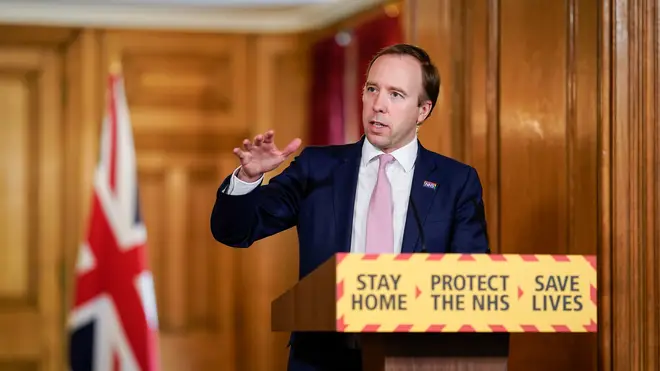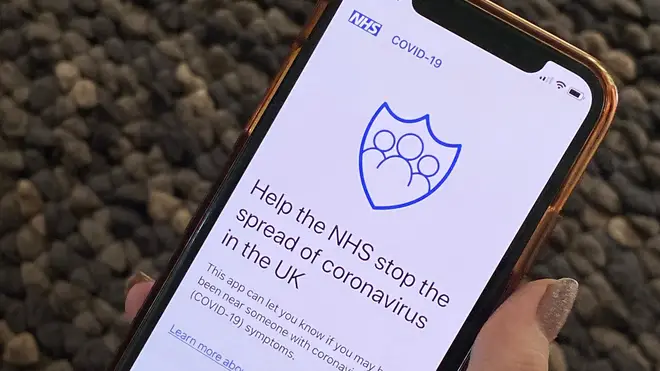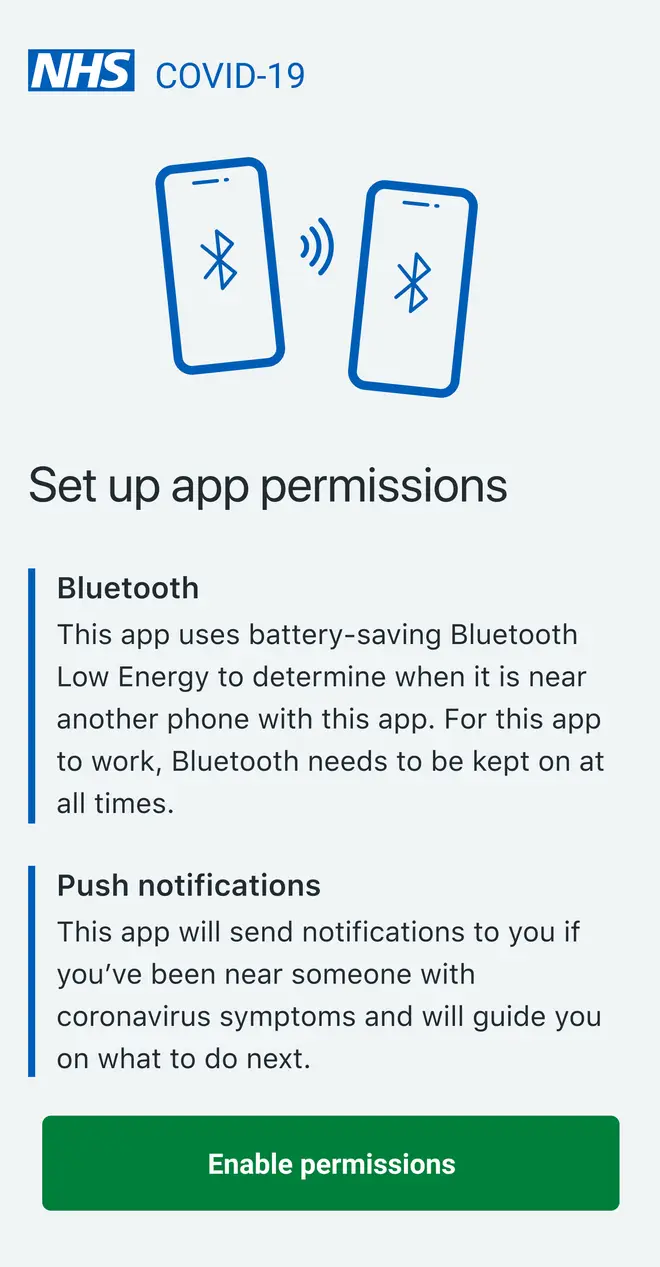
Henry Riley 7pm - 10pm
4 May 2020, 17:30

Health Secretary Matt Hancock today announced that testing for a new NHS coronavirus tracking app will begin on the Isle of Wight.
He urged the public to download the new contact tracing app to help to ease coronavirus lockdown measures and save lives.
Testing of the new app will start this week, Mr Hancock announced.
It is part of the Government's test, track and trace strategy and will be central to its efforts in slowing the spread of coronavirus.
Mr Hancock said at today's daily government update on coronavirus: "Last week we put in place the testing capability on the island, from tonight the contact tracing capability will go live and from tomorrow NHS staff on the island will be able to download the app.
READ MORE: UK sees lowest daily Covid-19 death toll since start of lockdown
"From Thursday, each one of the 80,000 households on the island will get a letter from the chief nurse with comprehensive information about the trial.
"Islanders will then be able to install the app."
Mr Hancock told Isle of Wight residents: "By downloading the app you are protecting your own health, you are protecting the health of your loved ones and the health of your community.
"I know that the people of the Isle of Wight will embrace this with enthusiasm because by embarking on this project and by embracing test, track and trace you will be saving lives."
But LBC and Global’s Tech Correspondent Will Guyatt warned that collecting personal data on such a large level could make it “attractive to hackers.”
He also said the government’s use of their own app, rather than one created by tech companies, is “not as friendly” to mobile phones and can impact battery life.
Matt Hancock said the app will use a "battery-saving" form of Bluetooth but our expert said this was a "fantasy" and there was only one type of Bluetooth.
Developed by NHSX, the health service's tech innovation arm, the app will use Bluetooth to anonymously monitor and log when app users come into contact with each other.

Users will input into the app when they have symptoms linked to Covid-19, and if the virus is suspected, they can then choose to share the proximity logs from the last 28 days with the NHS.
If any of that data shows contact with others which could be considered as having a high risk of transmission, those users will be alerted and given further instructions, including potentially being asked to self-isolate or be tested, with further updates then issued as test results come in.
Will Guyatt told LBC News: “The government have opted for a centralised app, where data is directly submitted to them and kept under their control on government servers.
“What is unclear is why they’ve gone for that option and not used Google or Apple, who are developing tools which would collect the data and then hand it to the government.
“They should work with the tech companies to utilise these tools.
“Apple and Google are changing their operating systems securely and developing APIs which give clearer routes to use the device, whereas the government are trying to utilise different ways of making the phone do the same thing – it’s not as friendly to the device.”
He added: “The difference in privacy between the two depends on who you believe handles data more securely.
“Apple and Google are responsible with data and it’s stored safely and securely.
WATCH LIVE: #coronavirus press conference (4 May 2020)
— UK Prime Minister (@10DowningStreet) May 4, 2020
Speakers:
🔵 @MattHancock, Health secretary
🔵 Prof Jonathan Van-Tam, Deputy Chief Medical Officer
🔵 Prof John Newton, coordinator of the national testing effort https://t.co/S1SeDUHEoH
“I’m not criticising the government, but having this information would make them more attractive to hackers, because it can prove people have been in a certain place at a certain time.
“Any new level of mass data collection like this is attractive to hackers.
“Eight weeks ago, you’d have said something like this was an erosion of your civil liberties, but people are more accepting because the government are selling it as a way to speed up a return to normality.
“We need to be careful we don’t sleepwalk into handing over more data, because as some other countries have said, contact tracing alone is not a way to leave lockdown.
“We also don’t know how long the government would store the data for.
“They’ve said that it will be shared with social media companies and GCHQ, but last time I checked, they were spies, so there are concerns on many levels.
“There’s a fear we could fall headfirst into giving our government more information than the Chinese give theirs.
“I’m all for it if it’s going to help, but I am concerned. I think some people are blindly supporting it without considering the implications.”

However, NHSX chief executive Matthew Gould said the app collected no specific personal data from users, instead relying on the anonymous keys assigned to each app user which could not be linked back to them.
"The app is designed so you don't have to give it your personal details to use it - it does ask for the first half of your postcode but only that.
"You can use it without giving any other personal details at all - it doesn't know who you are, it doesn't know who you've been near, it doesn't know where you've been."
But Mr Guyatt responded: "Centralised apps report everything back to the government - it gets stored on government servers.
"The government does not have a great track record for protecting sensitive data.
"And despite what Mr Gould says - centralised information could potentially be matched up with other information obtained by the government and re-identified.
"Mr Gould also stated that future versions of the app could ask people to give up more personal data too."
Professor Jonathan Van-Tam, deputy chief medical officer for England, said it was crucial large numbers of the population download the app as it could help with the easing of lockdown measures.
Listen & subscribe: Global Player | Apple Podcasts | Google Podcasts | Spotify
"We do have some uncertainties about how many people will download the app, and it will be important that a significant proportion of the population downloads the app for it to have the greatest chance of giving us additional oomph in the contact tracing space, which in turn will give us additional room for manoeuvre in terms of other social distancing easements that we can consider in the weeks and months to come.”
Mr Guyatt said “millions of users” would need to download the app for it to be effective.
He added: “Currently, around 20 of people with mobiles don’t have smartphones, so they can’t be involved, and they’re often those who are more likely to be at risk from Covid-19.
“There are also a lot of people who don’t know how to use their smartphones.
“We’d need about half of the population to use it to make the sample size worthwhile.
“A lot of people are putting their hope in technology, but people who work in tech aren’t convinced that this app will solve the problems it’s hoping to.
“Tech might be able to do something to help, but unless 50 million people download that app, I can’t see it doing what the government are hoping it will.”
Mr Gould urged the public to take part and confirmed a public push for people to download the app would accompany its full rollout.
"The level of impact of the app does depend on the level of uptake," he said.
"So we're going to mount a really serious campaign to make sure that people know that if they do want to carry on saving lives, protecting the NHS and get the country back on its feet then downloading the app is one way that they can do that.
"The app is exciting, but it's also not a silver bullet or a standalone solution.
"It is part of this wider strategy and it has to be seen as part of that strategy alongside the expansion of testing and human contact tracing that the Government is committed to."